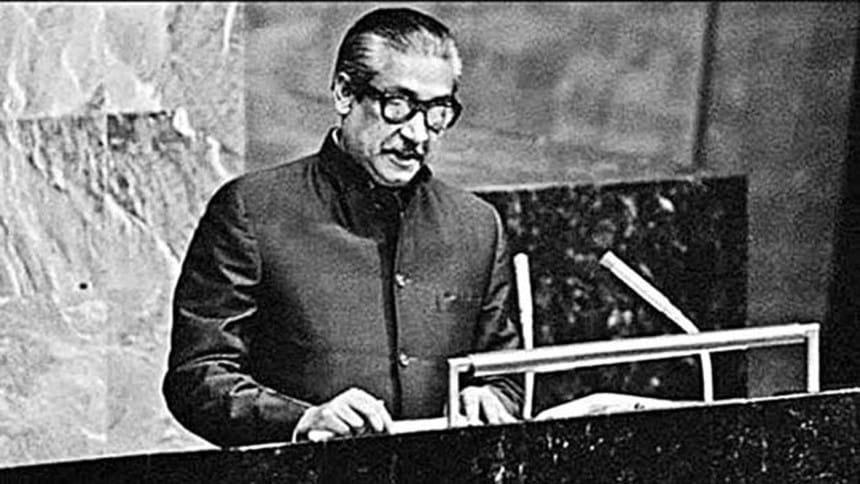Bangabandhu’s foreign policy legacy

Bangladesh this year celebrates its 50th anniversary of independence as well as the birth centenary of our Father of the Nation. On August 15, the nation also mourns the brutal assassination of Bangabandhu 46 years ago—a heinous act designed to erase all that he stood for. It would, therefore, behove us all to look around us today and take stock of the world we live in and the challenges we as a nation face.
Bangladesh's birth in 1971 was midwifed by the Cold War that had divided the world into two ideologically opposed camps and wet-nursed our early politics. Fifty years later today, the wheels of history have turned full circle and the world is once again in the grip of another cold war brewing, with somewhat different configuration.
For Bangabandhu, setting the parameters of the new state's foreign policy was a sine qua non for developing national resilience for his people's prosperity and the state's survival. It's essential moorings were: seeking better relations with all neighbours in our immediate region, the larger Asian region and the world at large, on the basis of respect for each other's sovereign independence, territorial integrity, and non-interference in each other's internal affairs; a deep and abiding commitment to "non-alignment, based on the principles of peaceful coexistence and friendship to all"; avoiding being caught in the jaws of competing regional or global powers; as one of the world's largest Muslim countries, fostering close relations with the OIC and all other Muslim countries; supporting the right of self-determination of all struggling people, everywhere; an abiding commitment to ensuring universal peace based upon justice for all peoples; and combating "the scourges of poverty, hunger, disease, illiteracy and unemployment", which required our proactive membership in all international fora, particularly the United Nations and all its specialised agencies, and the Commonwealth.
What are the challenges that threaten us or are likely to impact on us as a nation today and how should we cope with them?
Standing at the heart of Bangladesh, a panoramic view reveals conflict still raging between nations. On our west, in our immediate neighbourhood in India, we are witnessing an internal churning that appears as resurrection of the toxic narrative of the thirties that will not leave any neighbour untouched; the "cold-hot" conflict between India and Pakistan is more exacerbated than it was at the time of our independence; Afghanistan is in flames, with the Taliban's return to power imminent. Panning further west, one sees horrendous effects on a multitude of innocents caused by the continuing hostility between the states that control the heartland of fossil fuel reserves of the world in the Persian Gulf, with continuing war "fought-at-distance" between Saudi Arabia and Iran in Yemen showing no sign of abatement. An extension of this struggle magnifies and becomes more intangibly complex even further west, in what is known historically as the Levant.
Swivelling our gaze to our east, we see Myanmar in the throes of imminent implosion and possible state failure, likely to be followed by the probable explosion of multiple cluster bombs that will not leave unscathed any of its neighbouring states, including seemingly stable ASEAN. This explosive mix, exacerbated by fiercely contested disputes over waters of the strategic South China Sea, could be triggered by any spark to explode with dangerous consequences for all.
Overarching all these various conflicts or near conflicts within a "neo-Cold War paradigm", are two narratives: those of the US-led Indo-Pacific and the Chinese Belt and Road Initiative (BRI), both seeking to define a new world order, both set to robustly compete and contest in our home waters, the Bay of Bengal and the Indian Ocean.
Surreally, my panoramic 360-degree gaze reasserts the truism uttered by Faulkner so presciently: "the past is never dead. It is not even past". A full 50 years later, we appear to be back in seemingly the same regional and global stage, only this time, perhaps more dangerous. It is rendered more complicated by the "Global War" being waged—without exception on us all—by the Covid-19 pandemic, with existential consequences.
Our salvation lies in the tools and principles given by our Founding Father that enabled us to pull ourselves up and out of the earlier morass, to today transforming into one of the fastest growing economies in the world. Like then, our foreign policy must continue, first and foremost, to remain committed to preserving, protecting, projecting, and promoting our national interests. At the same time, it must, realistically and pragmatically, accept that we cannot develop, nor our people attain their dream cocooned in isolation from our immediate neighbours, our larger region, and the world. We need positive engagement with all, to continue to develop and grow.
We must adhere, without wavering, to the bedrock principle of "friendship to all with malice towards none". We must not align ourselves with anyone, against anyone. On the contrary, all current conditions demand that we do, in geo-strategic and geo-pollical terms, become the "Switzerland of the East".
In that context, while we should continue taking part in the economic and human development strands of the two competing narratives, the Indo-Pacific vision and the BRI, we must eschew any association with any hidden strategic or defence-oriented agenda that may be imbedded within them.
We must continue building further upon the excellent all-round relations that we have developed with both India and China, each in its own parallel track. Our engine of growth needs both these tracks to roll forward on. We must at the same time synergise these relations to strengthening, and expanding, the still fledgling sub-regional and regional cooperation agenda.
This is Asia's century. The focus and attention of our diplomacy in the 21st century must qualitatively and vigorously shift eastward to Southeast and East Asia. We must revitalise our ancient ties with their peoples.
We have always demonstrated our total and unequivocal commitment to world peace through our very active membership in the United Nations, its many specialised agencies, and particularly most commendably, with its global peacekeeping role. We must continue and further build upon this.
We must continue our proactive and energetic engagement with international fora, like the Commonwealth and NAM.
Being among the four largest Muslim-majority countries in the world, we must remain an active and engaged member of the OIC and with the larger Muslim "Ummah", not taking side with any one or group of fellow Muslim state against another brotherly Muslim state or states. Our value will lie in our advocacy and practice of moderation, tolerance and abjuring any self-righteousness. Our participation in the recent inauguration ceremony of Iran's newly elected president was the right thing to do.
Located at the apex of the Bay of Bengal, that is the middle Bay of the strategically contested Indian Ocean, we are now positioned to act as a vitally important hub of multi-modal connectivity between the Indian and Pacific Oceanic regions. We must consolidate this.
Vulnerable as we are to the devastatingly deleterious consequences of global warming and climate change that threaten us existentially by upending the ecological balance of the region, we have taken on, and must sustain, a leadership role in all environment-related dialogues and initiatives. We should champion the idea of a larger Bay of Bengal regional cooperation framework that would encourage all Bay countries, littoral or adjacent with interest, to collaborate and devise a governance structure for this existentially important Commons.
All our foreign policy messages must continue to rebroadcast Bangabandhu's universal message of peace with justice and equity for all that he resonantly called for in his address to the United Nations in October 1974. In this context, I note with great interest and whole-heartedly commend our prime minister's initiative to hold the World Peace Conference in December this year. We must prepare well for hosting and guiding this event in these very troubled times.
I see this as an opportunity once again to reiterate to the world the essential tenets we believe the world should be guided by in international relations. Following our assuming the Chair of IORA later this year, we should use the platform of the World Peace Conference to reiterate Bangabandhu's clarion call for an Indian Ocean as a zone of peace. As a first step, let us take the initiative for ensuring that our own Bay of Bengal becomes a zone of peace, friendship, neutrality and tranquillity, free from disputes, with open passage for all peaceful maritime access, for sustainable conservation of its integrated ecosphere and managed harvesting of its blue water resources, facilitating connectivity between peoples east and west for comprehensive growth, development, and self-fulfilment.
Our foreign policy must continue to ensure our ability to achieve and project national resilience. Our demonstrated economic development must be underpinned by securing healthcare of our human capital. Without ensuring that, our infrastructure development will be meaningless. The current Covid pandemic has dealt a grievous blow to our immediate and long term economic growth ambitions. This virus has demonstrated totally unanticipated sentient qualities, mutating into more deadlier variants faster than human adaptability to subdue it. The only way out is to vaccinate at least 80 percent of not only our national population, but more importantly, of the global population. Vaccine production and development is controlled by a few governments and mega MNCs, who are practicing what is essentially "vaccine colonialism". This must be broken. We should strive to add vaccine manufacturing to our industrial mix, because this is the next growth industry.
If August 15, 1975 was the day when the "empire struck back" to roll back our Liberation War history and negate Bangabandhu's legacy, let us transform this day of mourning into a day for rededicating ourselves to his ideals and visions, strengthening and building further on the foundational moorings he left to us as his legacy.
Tariq Karim is a retired Ambassador of Bangladesh. At present, he is Director of the Centre for Bay of Bengal Studies at the Independent University, Bangladesh.

 For all latest news, follow The Daily Star's Google News channel.
For all latest news, follow The Daily Star's Google News channel. 



Comments